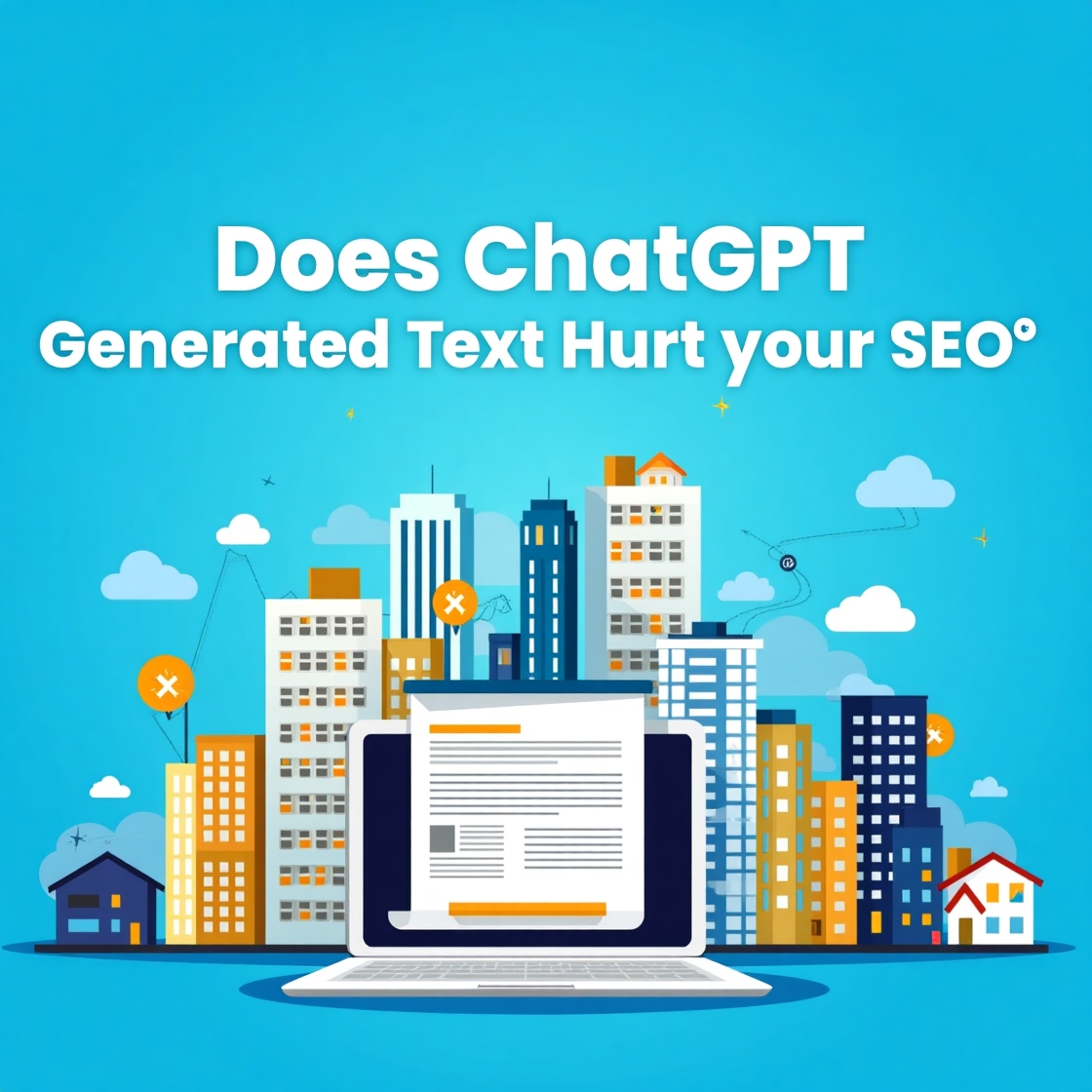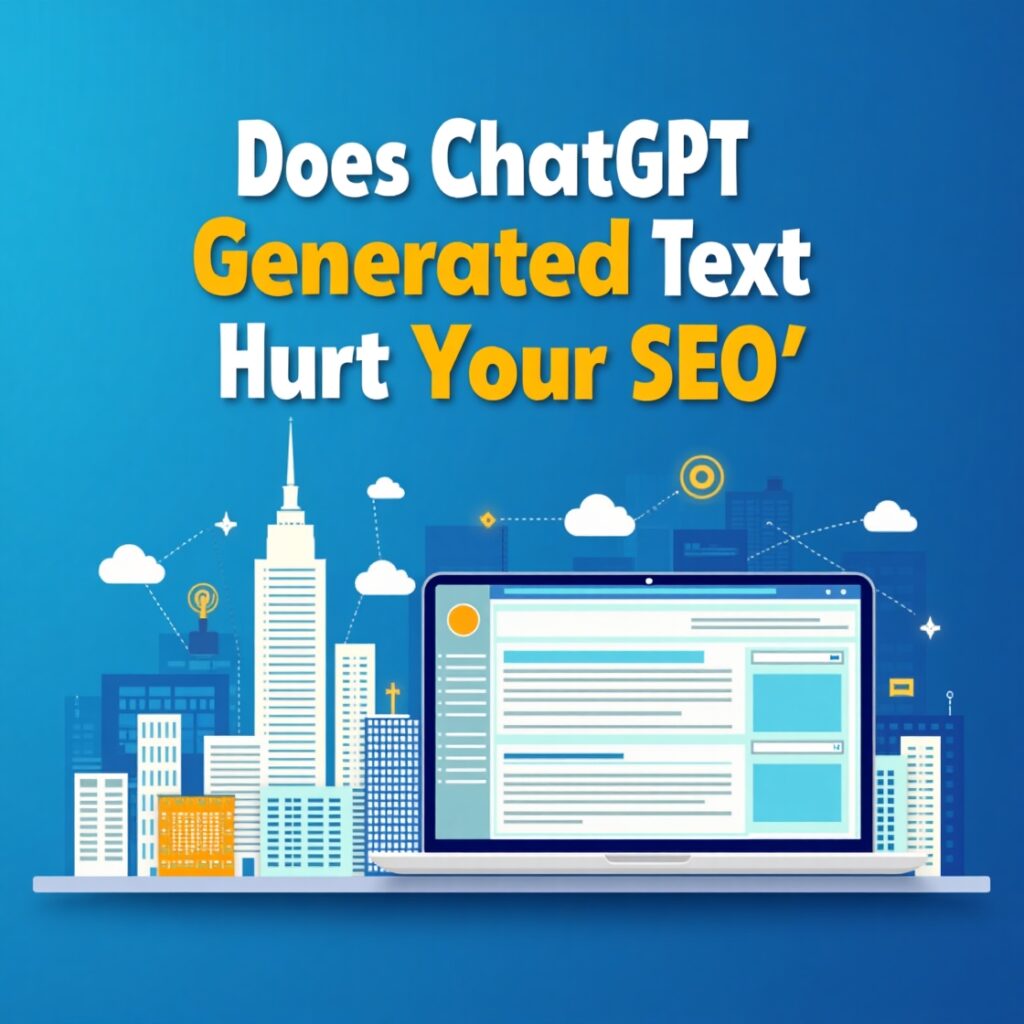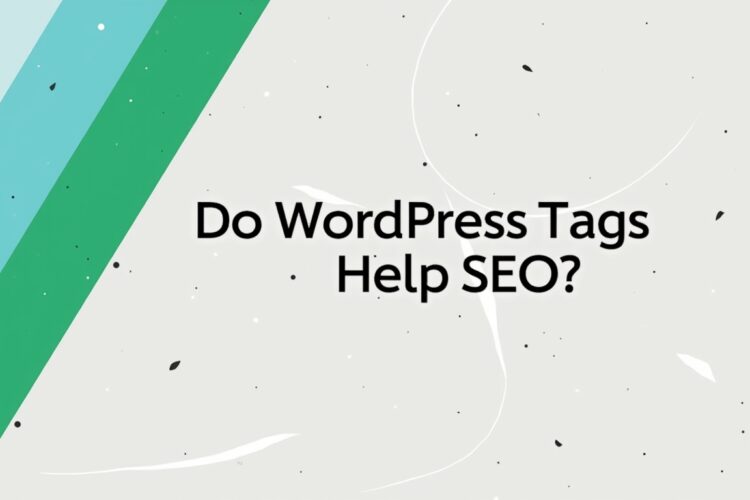
In today’s fast-paced digital world, creating content that ranks well on search engines like Google is a top priority for businesses and marketers. With the rise of artificial intelligence (AI) tools like ChatGPT, many are tempted to use AI-generated text to produce blog posts, product descriptions, and website content quickly. But a burning question lingers: Does ChatGPT-generated text hurt your SEO? This topic is trending among SEO professionals, content creators, and website owners who want to leverage AI without risking their search engine rankings.
The importance of this question cannot be overstated. Search engine optimization (SEO) is the backbone of online visibility, driving organic traffic and building brand credibility. If AI-generated content compromises your rankings, it could undo months or years of hard work. On the other hand, when used strategically, AI tools like ChatGPT can save time and enhance your content strategy. In this article, we’ll dive deep into the features, benefits, challenges, and trends surrounding ChatGPT-generated text and its impact on SEO.
Understanding ChatGPT and Its Role in Content Creation
ChatGPT, developed by OpenAI, is a powerful language model that generates human-like text based on user prompts. It’s widely used for tasks like writing blog posts, crafting social media updates, and even generating code. For SEO professionals, ChatGPT offers a tempting shortcut to produce large volumes of content quickly. But before diving into its impact on SEO, let’s break down its key features and how it fits into content creation.
Key Features of ChatGPT for Content Creation
- Speed and Efficiency: ChatGPT can generate a 500-word article in seconds, saving hours of research and writing time.
- Versatility: It can write on virtually any topic, from technical SEO to lifestyle blogs, adapting to different tones and styles.
- Idea Generation: ChatGPT excels at brainstorming outlines, headlines, and meta descriptions, helping creators overcome writer’s block.
- Scalability: Businesses can produce content for multiple pages or campaigns without hiring additional writers.
These features make ChatGPT a game-changer for content creators. However, its output isn’t perfect, and its impact on SEO depends on how it’s used.
Benefits of Using ChatGPT for SEO
When used thoughtfully, ChatGPT can enhance your SEO strategy in several ways:
- Time-Saving: AI-generated drafts reduce the time spent on initial content creation, allowing you to focus on optimization and editing.
- Keyword Integration: ChatGPT can incorporate target keywords naturally, helping you align content with search intent.
- Content Ideation: It generates ideas for blog topics, FAQs, and long-tail keywords, boosting your content pipeline.
- Cost-Effective: For small businesses or startups, AI tools reduce the need for expensive content writers.
For example, an e-commerce site might use ChatGPT to create product descriptions for hundreds of items, then refine them with human edits to ensure uniqueness. This approach saves time while maintaining quality.
Challenges of ChatGPT-Generated Text

Despite its benefits, ChatGPT has limitations that can negatively affect SEO if not addressed:
- Lack of Originality: AI models are trained on existing data, which can lead to generic or repetitive content that lacks a unique voice. Google prioritizes original, value-driven content, and generic text may fail to rank well.
- Accuracy Issues: ChatGPT can produce outdated or incorrect information, damaging your site’s credibility. For instance, it might reference obsolete SEO practices, misleading readers.
- Duplicate Content Risk: If multiple websites use similar prompts, ChatGPT may generate near-identical text, triggering Google’s duplicate content penalties.
- Missing Human Touch: AI content often lacks emotional depth, personal anecdotes, or industry insights that engage readers and signal expertise.
- Over-Optimization: Some users stuff AI content with keywords, making it appear spammy and reducing readability.
These challenges highlight the need for human oversight to ensure AI content meets Google’s quality standards.
Google’s Stance on AI-Generated Content
To understand whether ChatGPT-generated text hurts SEO, we must first examine Google’s perspective. As the dominant search engine, Google’s guidelines shape how content ranks on search engine results pages (SERPs).
Google’s Focus on Quality, Not Creation Method
In February 2023, Google clarified that it doesn’t penalize AI-generated content outright. Instead, it evaluates content based on its quality, relevance, and adherence to the E-E-A-T framework (Experience, Expertise, Authoritativeness, Trustworthiness). According to Google’s Search Central Blog, high-quality content is rewarded, whether written by humans or AI.
This means ChatGPT-generated text won’t hurt your SEO if it’s:
- Original: Provides fresh insights or perspectives.
- Helpful: Answers user queries comprehensively.
- Relevant: Aligns with search intent and target keywords.
- Trustworthy: Backed by accurate facts and credible sources.
However, low-quality AI content—such as thin, repetitive, or keyword-stuffed text—can trigger ranking penalties, just like poorly written human content.
Google’s Detection Capabilities
There’s ongoing debate about whether Google can detect AI-generated content. Some experts believe Google uses pattern recognition to identify AI text, such as statistical word choice or lack of contextual depth. Others argue that advanced models like ChatGPT (built on GPT-4) produce text too human-like to be reliably detected.
While Google hasn’t confirmed specific AI detection methods, it’s safe to assume its algorithms prioritize user engagement metrics (e.g., time on page, bounce rate) and content quality over the creation method. If ChatGPT content feels robotic or fails to engage readers, it may rank poorly due to weak user signals, not because it’s AI-generated.
How ChatGPT-Generated Text Can Hurt Your SEO
While Google doesn’t ban AI content, certain pitfalls can harm your rankings if you rely on ChatGPT without proper optimization. Let’s explore the key risks and how to avoid them.
1. Duplicate or Generic Content
ChatGPT pulls from vast datasets, which can result in text that mirrors existing content online. If your AI-generated blog post resembles a competitor’s, Google may flag it as duplicate content, leading to lower rankings or deindexing.
How to Avoid It:
- Use plagiarism checkers like Copyscape to ensure uniqueness.
- Rewrite AI drafts to reflect your brand voice and add original insights.
- Include case studies, personal experiences, or data-driven analysis to differentiate your content.
For example, when writing about “does ChatGPT generated text hurt your SEO,” add unique perspectives, such as your experience with guest posting or industry-specific SEO strategies.
2. Low User Engagement
AI content often lacks the emotional resonance or storytelling that keeps readers on your site. If users bounce quickly or spend little time on your page, Google interprets this as a sign of low-quality content, hurting your rankings.
How to Avoid It:
- Add engaging elements like anecdotes, humor, or relatable examples.
- Use clear calls-to-action (CTAs) to encourage comments, shares, or newsletter sign-ups.
- Break up text with visuals, bullet points, and subheadings for better readability.
3. Inaccurate or Outdated Information
ChatGPT’s knowledge is based on pre-existing data and may include inaccuracies or outdated facts. Publishing incorrect information can erode trust with readers and signal low credibility to Google.
How to Avoid It:
- Fact-check all AI-generated content using reliable sources.
- Update statistics, trends, or references to reflect 2025 data.
- Cite credible sources to boost E-E-A-T.
4. Keyword Stuffing
Some marketers overuse keywords in AI content to “optimize” for SEO, resulting in unnatural, spammy text. Google’s algorithms detect keyword stuffing and may penalize your site.
How to Avoid It:
- Use keywords sparingly and naturally, focusing on semantic SEO (related terms and context).
- Prioritize user intent over keyword density.
- Edit AI content to ensure it flows like a human conversation.
5. Lack of E-E-A-T
Google’s E-E-A-T framework emphasizes content that demonstrates real-world experience, expertise, and authority. ChatGPT, while advanced, can’t replicate the nuanced insights of an industry expert, which may lead to lower rankings for competitive keywords.
How to Avoid It:
- Supplement AI content with expert input, such as quotes from SEO professionals or your own insights.
- Showcase author credentials (e.g., “Malik, SEO Expert at HQLinkers”) to build trust.
- Link to authoritative sources and internal pages, like your guest posting services at HQLinkers.
Best Practices for Using ChatGPT in SEO
To harness ChatGPT’s potential without harming your SEO, follow these best practices to create high-quality, user-focused content.
1. Use ChatGPT as a Starting Point
Treat AI-generated text as a first draft, not a final product. Use ChatGPT to:
- Generate outlines for blog posts or FAQs.
- Brainstorm long-tail keywords, like “does ChatGPT generated text hurt your SEO.”
- Write meta descriptions or introductory paragraphs.
Then, refine the output to align with your brand voice and SEO goals.
2. Add Human Oversight
Human editing is crucial to elevate AI content. Focus on:
- Personalization: Add your unique perspective or industry insights.
- Engagement: Incorporate storytelling or examples to connect with readers.
- Optimization: Structure content with H2/H3 headings, bullet points, and internal links.
For instance, when writing for HQLinkers, emphasize your expertise in guest posting and link to relevant services.
3. Optimize for Search Intent
Google rewards content that matches user intent (informational, navigational, transactional). Use ChatGPT to draft content, then tailor it to:
- Answer specific user queries (e.g., “How to use ChatGPT for SEO without penalties”).
- Include actionable tips or step-by-step guides.
- Address related questions in an FAQ section.
4. Enhance E-E-A-T
To align with Google’s guidelines, boost your content’s credibility by:
- Citing reputable sources (e.g., Google’s Search Central Blog or industry reports).
- Adding author bios with credentials.
- Linking to high-authority internal pages, such as HQLinkers’ guest posting services.
5. Monitor Performance
After publishing AI-enhanced content, track its performance using tools like Google Analytics or Search Console. Look for:
- Ranking Changes: Are your pages climbing or dropping in SERPs?
- Engagement Metrics: Are users staying longer or bouncing quickly?
- Traffic Trends: Is organic traffic increasing for target keywords?
Adjust your strategy based on data to ensure continuous improvement.
Trends in AI-Generated Content for SEO (2025)
As AI technology evolves, so does its role in SEO. Here are the top trends shaping the use of ChatGPT and similar tools in 2025:
- AI-Human Collaboration: More businesses are combining AI efficiency with human creativity to produce standout content. Tools like Surfer AI offer built-in SEO features, such as keyword analysis and content optimization.
- Zero-Click Searches: AI-generated search results (e.g., Google’s generative search) are increasing zero-click searches, where users find answers directly on SERPs. This makes it critical to optimize for featured snippets and rich results.
- Focus on Semantic SEO: Google’s algorithms prioritize context and related terms over exact-match keywords. AI tools can help identify semantic clusters, but human edits ensure content feels natural.
- AI Detection Tools: While Google may not penalize AI content, some platforms use detection tools to flag unedited AI text. Humanizing content with tools like Surfer’s AI Content Humanizer reduces this risk.
- Personalization: AI tools are improving at tailoring content to specific audiences, but human input is still needed to capture brand voice and user preferences.
These trends underscore the importance of using ChatGPT strategically to stay ahead in the competitive SEO landscape.
Final Thoughts
So, does ChatGPT-generated text hurt your SEO? The answer depends on how you use it. When used carelessly, AI content can lead to duplicate text, low engagement, and credibility issues, all of which harm your rankings. However, with proper optimization, ChatGPT can be a powerful tool to streamline content creation, generate ideas, and scale your SEO strategy. By combining AI’s efficiency with human expertise, you can create original, engaging, and SEO-friendly content that aligns with Google’s E-E-A-T guidelines.
To succeed, treat ChatGPT as an assistant, not a replacement. Edit drafts for uniqueness, fact-check information, and optimize for user intent. Monitor performance and stay updated on trends to keep your content competitive in 2025 and beyond. At HQLinkers, we specialize in crafting high-quality, SEO-optimized content through strategic guest posting and expert services. Ready to boost your rankings? Visit HQLinkers to learn more.





